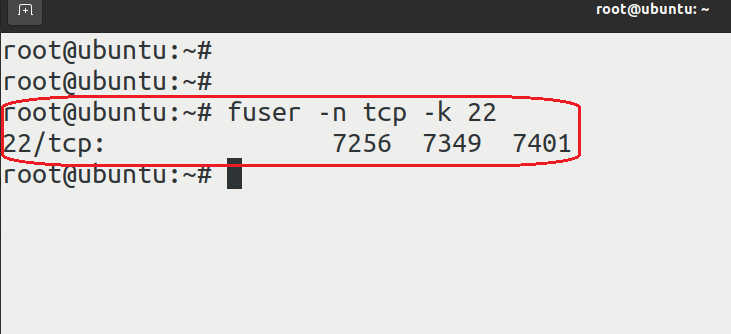Linux kill process on specific port
Kill process on port using command fuser
fuser is a linux command to identify processed using files or socket
fuser -k -n tcp PORT
-n tcp: select tcp protocol-k: killPORT: port number
Alternatively you can use:
fuser -k PORT/tcp
PORT/tcpis shortcut of-n tcp PORT
Below is a real example:
root@ubuntu:~# fuser -n tcp -k 22
22/tcp: 7256 7349 7401
root@ubuntu:~#
root@ubuntu:~#
root@ubuntu:~# fuser -k 22/tcp
22/tcp: 7643
root@ubuntu:~#
Kill process on port using command lsof
lsof stands for list open files.
kill -9 `lsof -t -i:port`
OR
kill -9 $(lsof -t -i:port)
-t: produce process ID only-i:port: specify a port
For example ,below command kill all processes on port 22 (ssh)
root@ubuntu:~# kill -9 `lsof -t -i:22`
Kill process on port manually
Normally I kill process on port manually , first filter out the IDs of processes who are on port ,then use kill -9 PID to kill them.
1.list process on port
-
use linux command
ssss -apn |grep :PORT-a: Display both listening and non-listenning-p: show process ID-n: numeric , eg: resove sshd as number 22
OR
-
use linux command
netstatnetstat -apn | grep :PORT
Below are examples which list processes on port 22 (ssh)
root@ubuntu:~# ss -apn |grep :22
tcp LISTEN 0 128 0.0.0.0:22 0.0.0.0:* users:(("sshd",pid=7834,fd=3))
tcp ESTAB 0 0 192.168.75.128:22 192.168.75.1:61270 users:(("sshd",pid=7894,fd=4),("sshd",pid=7842,fd=4))
tcp LISTEN 0 128 [::]:22 [::]:* users:(("sshd",pid=7834,fd=4))
root@ubuntu:~#
root@ubuntu:~# netstat -apn | grep :22
tcp 0 0 0.0.0.0:22 0.0.0.0:* LISTEN 7834/sshd: /usr/sbi
tcp 0 0 192.168.75.128:22 192.168.75.1:61270 ESTABLISHED 7842/sshd: j [priv]
tcp6 0 0 :::22 :::* LISTEN 7834/sshd: /usr/sbi
root@ubuntu:~#
7834/sshd: where 7834 is one of the process ID
2.kill those processes using kill -9 processID
Then you can kill those particular processes using linux command kill.
